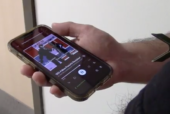By Jessica Harper, Domonique Isabeau and Cesia Lopez
For many college students, graduation marks a huge moment of transition into adulthood. Many students count on internships to help them make that transition.
But at the height of the pandemic last year, many internships disappeared. The job site Glassdoor reported that in April 2020, half of all internship opportunities were cancelled.
Those cancellations left both students and employers scrambling. Many students require internships for academic credit, and many employers rely on the help interns provide. At companies that still offered internships, students experienced these opportunities in isolation at-home.
With opportunities almost going extinct, CSU Northridge had to change its curriculum to give other options to students who needed internships for academic credit.
In CSUN’s Journalism Department, Professor Stephanie Bluestein runs the class that students take to earn credit for an internships. The department has considered canceling its internship course because of lack of interest. But Bluestein said the department tweaked the curriculum to allow the course to continue.
“In Fall 2020,” Bluestein said in an email, “we made changes to the internship class to allow students to create an online portfolio and do free online tutorials in lieu of an internship because there just weren’t that many internship opportunities available then. (Keep in mind this was before any vaccine was available.)”
Bluestein recounts that students interning at public relations firms during the pandemic had the easiest transition to remote work. Those companies were able to pivot to remote work more easily than broadcasters.
Internship opportunities have slowly started to emerge again, and many employers are giving students the option to work from home.
“More internships are available now but it’s not as many as before the pandemic,” Bluestein said. “A large number of internships are still offered on a virtual, remote bases.”
With internships slowly returning to normal, Bluestein is not sure if the CSUN Journalism department will continue to offer spots in its internship class to students without an internship placement. However, administrators, students and employers are optimistic that internships will continue to be an integral part of a student’s education and as a leg up to entry into the workforce.
During the onset of the pandemic, Erick Gabriel was an intern at E! Entertainment. After completing his internship, he was hired full-time as a programming coordinator. Erick felt this experience gave him an edge over other candidates for his job.
“It helped me a lot,” he said, “as I had just interned there prior, I had known the language of NBC, knew how things already ran, had experience already working remotely from home. It gave me that extra boost that we don’t really have to teach him this, we don’t have to teach him the ropes, he’s already worked from home, he’s already comfortable working from home. That definitely gave me the ultimate, okay he’s the choice for the role.”
Those who have worked internships during the pandemic say the experience made them versatile and shows the employer that they can work successfully in this difficult period.
Diana Medina, who coordinates CSUN’s federal work study program, believes most student workers will soon return to in-person jobs.
“Student employment offers a work experience that combined with their degree will set them apart from other candidates once they start seeking those professional positions,” Medina said.
Bluestein agreed students set themselves apart to employers by completing one or more internships.
Zoe Ives, an intern for the public media news organization KPCC and LAist, said she was not intimidated by interning during the pandemic.
“It was a welcome release [to work from home],” Ives said. “Very much looking forward to an opportunity to work remotely as I saw it as obviously being much safer than the alternative.”
One first-year student at CSU Northridge, Tyrome Walton was not concerned about finding an internship in the future. Walton felt that there would be more restrictions and that was acceptable as long as he was getting to have work experience in his prospective field.

 Tweet this Video
Tweet this Video Share on Facebook
Share on Facebook Share via E-mail
Share via E-mail

